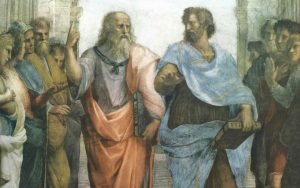Podcast episode
July 11, 2018
Episode 38: The Esoteric Aristotle, Part I
 In terms of the history of western esotericism, it makes sense to talk about at least four different Aristotles, although only one of these four ever really lived. The real, historical Aristotle studied with Plato for many years, but had an unbelievably fertile, independent philosophic mind of his own, and wrote revolutionary works on a huge range of subjects. His works continue to inform and challenge western culture to this day.
In terms of the history of western esotericism, it makes sense to talk about at least four different Aristotles, although only one of these four ever really lived. The real, historical Aristotle studied with Plato for many years, but had an unbelievably fertile, independent philosophic mind of his own, and wrote revolutionary works on a huge range of subjects. His works continue to inform and challenge western culture to this day.
But the real heroes of western esotericism are the other three Aristotles: Aristotle the esoteric philosopher, as interpreted by late antique Platonism, Aristotle the author of the Arabic works The Theology of Aristotle and the Book on Causes, and Aristotle the medieval authority on occult sciences. In this double episode we explore the convoluted history of the esoteric Aristotle, a man who never lived but who forever changed the secret history of western esotericism.
Works Discussed or Cited in this Episode:
- Aristotle: A. claims that Plato’s theory of forms failed never did what it was intended to do (A. Met. I.9, III.2; Eth. Nic. I.6 1096a11-1096a16).
- Galen: the earliest use of the term ἐσωτερικός in Liddel and Scott’s lexicon is to Galen 5.313.
- Plutarch: Life of Alexander 7.3. On the dating of the Alexander-Aristotle correspondence cited in this episode, see Pépin 1984, 28.
- Porphyry: the title of Porphyry’s lost work on the unity of Plato and Aristotle’s thought (Περὶ τοῦ μίαν εἶναι τὴν Πλάτωνος καὶ Ἀριστοτέλους αἵρεσιν) is preserved at Suda IV 178, 21-22.
Sorabji and Co.’s Ancient Commentators on Aristotle series has a website which gives some idea of the scope of the project.
A Late Platonist curriculum which begins with Aristotle and later moves on to Plato can be found in Marinus’ Life of Proclus (13); as we might expect, the educational cursus is framed in terms of a progressive initiation, the Platonist aspirant moving from the ‘preliminary and lesser mysteries of Aristotle’ to the ‘mystagogy of Plato’.
Recommended Reading:
As always, the Stanford Encyclopedia of Philosophy‘s article on Aristotle is a good place to start if you want to know more about the historical figure of Aristotle and his thought, and Peter Adamson’s History of Philosophy without any Gaps podcast has lots of useful things to say about the Stagirite as well.
A bibliography by John Sellars of scholarship and primary sources relating to the huge Aristotelean commentary tradition can be found online.
Useful books:
- Hadot, I. (1987). ‘Les introductions aux commentaires néoplatoniciens de oevres de Platon et Aristotle dans le cadre général du cursus des études philosophiques’. In: Tardieu, M. (Ed.), Les regles de l’interpretation, Éditions du Cerf, Paris.
- Hadot, I., 2015. Athenian and Alexandrian Neoplatonism and the Harmonization of Aristotle and Plato. Brill, Leiden.
- Karamanolis, G. E., 2006. Plato and Aristotle in Agreement? Platonists on Aristotle from Antiochus to Porphyry. Oxford University Press, Oxford/New York, NY.
- Pépin, J. (1984). ‘L’Arcane Religieux et sa Transposition Philosophique dans la Tradition Platonicienne’. In: (Ed.), La Storia della Filosofia come Sapere Critico, Angeli.
- Rist, J. (1973). ‘The One of Plotinus and the God of Aristotle’, Review of Metaphysics 27 : 75-87.
- Saffrey, H. D. (1992). ‘Accorder entre elles les traditions théologiques: Une charactéristique du Néoplatonisme Athénien’. In: Bos, E. (Ed.), On Proclus and his Influence in Medieval Philosophy, Brill, Leiden.
- Sorabji, R. (ed.), (1990), Aristotle Transformed: The Ancient Commentators and their Influence, Duckworth, London.
Themes
Aristotle, Esoteric Hermeneutics, Philosophy, Plato, Plutarch of Chaironeia, Pseudo-Aristotle, Self-Hiding Secret


Alan Lee
June 8, 2020
One of the first Occult writers I read was Robert Anton Wilson (praise Bob!) in 2006 or so. He was a proponent of Non-Aristotlean Logic, and commentated that Aristotlean logic “subliminally programs us to invent fictitious certainties.”
However over the past decade plus that I learned more about Esotericism, I feel that I took in a lot of RAW’s notions without doing my own research on different subject matters, some of which run contrary to my later findings. For example, he wrote preference for Protestantism over Catholicism, which I find odd for a member of the OTO since the Roman Catholic Church preserved more of Plato’s teachings than Protestantism, which also led to Evangelical and Born Again movements which contributed more to RAW’s “New Inquisition” idea than say the modern Catholic Church. In addition, I find that Jodo Shinshu, the Buddhist denomination Bob wrote highly about, removes esotericism and deities from Buddhist practice more-so than many other Japanese Buddhist groups. Perhaps, Wilson is also not the best commentator on Aristotle either then.
Having said that, I feel many Occult writers could benefit from reading academics such as Hanegraaff as much as trusting their own gut intuition.